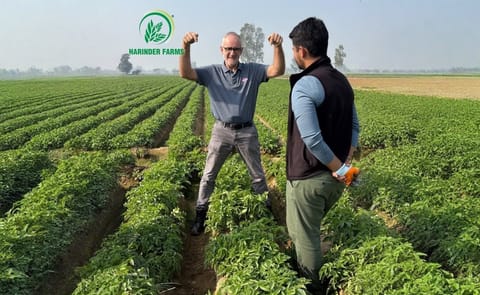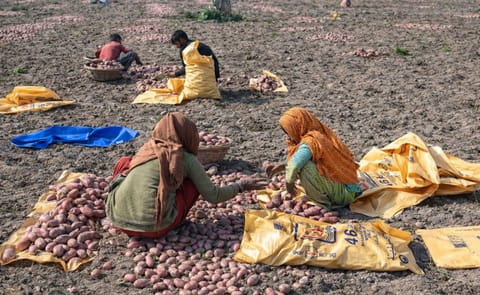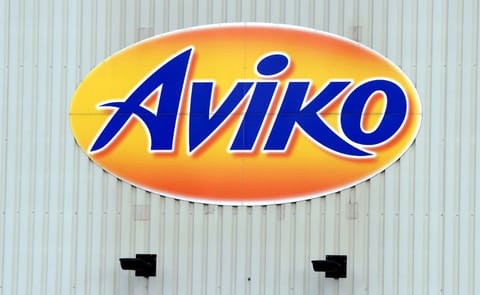Farmers harvesting potatoes. Mondulkiri, says it could capitalise on potato farming as demand grows in Cambodia.
Cambodia pilot potato project looks to expand after high demand

The strength in demand for potatoes grown in Mondulkiri, Cambodia, has farmers in the region planning to expand their cultivation for next season, says Song Kheang, director of the province’s agriculture department.
He added there are 10 families in Mondulkiri province producing potatoes currently and that the growing season lasts for three months from November through January. Kheang added that potato cultivation has been in a pilot stage in the province for three years now. He said cultivation covered just one hectare of land this year.
Song Kheang:
Song Kheang:
Song Kheang:
Tropicam Chief Executive Officer Hun Lak said in January that his company, the Ministry of Agriculture, Forestry and Fisheries, chefs’ associations and farmers met to discuss the advantages of a partnership between producers, buyers and consumers in Mondulkiri province and to set out a contract with the farmers.
He added the company will work with around 70 clusters of farmers in Mondulkiri and said the programme will encourage them to grow produce that meets the highest potential in market demand for produce successfully attaining GAP standards.
Hun Lak:
Hun Lak:
Hun Lak:
He added there are 10 families in Mondulkiri province producing potatoes currently and that the growing season lasts for three months from November through January. Kheang added that potato cultivation has been in a pilot stage in the province for three years now. He said cultivation covered just one hectare of land this year.
Song Kheang:
"This was essentially training and piloting in 2021. However, we saw fruitful results. Potato cultivation yields 25 to 30 tonnes per hectare on average."He added that previously 20 to 30 varieties of potatoes were grown in the province but it was determined that nine specific varieties were best suited for cultivation in the region. Farmers can earn 6,000 riels (~1.48 USD) per kilogramme with most of the market for the crop being in Phnom Penh.
Song Kheang:
"We did not see any COVID-19-related impact on the market. Furthermore, because the harvest season for potatoes has ended, there is some potential for the cultivation of vegetables such as cabbage, Chinese cabbage and carrots, which are in high demand.”Kheang noted that farmers are being urged to reserve seedlings for growing next year and says his department hopes and expects there will be more partners and farmers choosing to join in the project expansion because there is such a good market for the crop.
“The potato, though, affords real potential to the province’s farmers and our department is promoting the growing of more."
Song Kheang:
"There are some challenges in maintenance of the crop, so we need to take care of that by providing training to the farmers to enhance their skills and knowledge so that they can expand further."Tropicam Fruit and Vegetable Co Ltd is rolling out a contract farming agreement with groups of farmers in the province on the supply, purchase and safe production of fruit and vegetables according to Good Agriculture Practice (GAP) standards.
Tropicam Chief Executive Officer Hun Lak said in January that his company, the Ministry of Agriculture, Forestry and Fisheries, chefs’ associations and farmers met to discuss the advantages of a partnership between producers, buyers and consumers in Mondulkiri province and to set out a contract with the farmers.
He added the company will work with around 70 clusters of farmers in Mondulkiri and said the programme will encourage them to grow produce that meets the highest potential in market demand for produce successfully attaining GAP standards.
Hun Lak:
"We selected Mondulkiri as the kick-off province to roll out the GAP standard for vegetables and fruit in our programme and will mobilise the farm clusters producing GAP standard vegetables so that we can best understand the source of production, the yields, plantation areas and quality control.”Lak said the benefits to farmers entering into contract farming with the company include an increase of income and achieving production efficiencies through crop rotation. Contract farming also delivers price stability to a sustainable market and strengthens farmers’ networks, which contributes to increasing trust with credit institutions. All of the above factors are indicative of contract farming’s ability to enhance the well-being of the nation’s people and its environment.
“We want the GAP standard for vegetables and fruits to be recognised and sought out by local consumers."
Hun Lak:
"While Mondulkiri is the first provincial model to roll out the project, we have piloted previously in Kandal and Kampong Chhnang."Lak explained that farmers who join the Tropicam project are asked to grow vegetables by scheduled planting and harvests. Tropicam then buys all the yield and packages it for distribution to the market.
Hun Lak:
"We offer a better price than prevailing market prices once farmers implement the GAP standard."
Like to receive news like this by email? Join and Subscribe!
Get the latest potato industry news straight to your WhatsApp. Join the PotatoPro WhatsApp Community!
Sponsored Content
Sponsored Content
Sponsored Content
Sponsored Content








